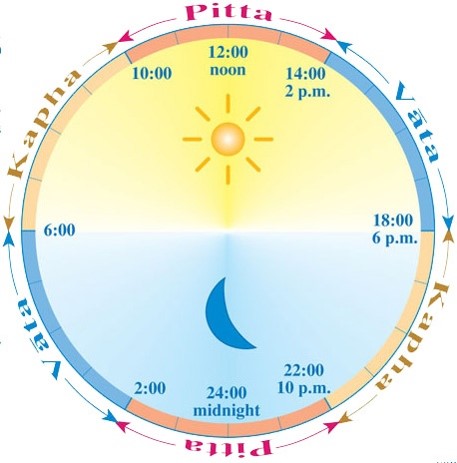Living in biorhythm
The change from summer time to winter time has once again triggered a discussion about how harmful time changes can be. Many people have a hard time with a change of rhythm. Why is that? Why does our inner beat go with the rhythm of nature and not with the clock? Maharishi Ayurveda and modern medicine provide interesting answers.
The ancient Ayurvedic texts assume that man and nature are one. Man reflects all the laws of nature. When we speak of nature, we superficially see the material existence of nature. However, this is constantly in flux, changing from moment to moment. In this change there is order. This order is expressed in the rhythms and cycles of nature. We humans feel very clearly the rhythmic changes that are shaped by the passing of day and night and by the seasons.
Daily rhythm of the doshas in nature
The three doshas Vata, Pitta and Kapha are expressions of the five elements space, air, fire, water and earth. Every living being and every object is composed of these elements in varying proportions. But not only the material composition of things is related to these elements, also the temporal sequence of changes. Most changes in creation are recurring cycles that occur at different speeds. Each cycle needs the energies of Vata, Pitta and Kapha to function.
Let's look at the course of a day: in the morning it is cool and humid, which corresponds to kapha dosha (earth and water). At noon it is warmest, pitta (fire) dominates. The evening brings cooling again, but is typically characterised by more wind and dryness than the morning, which corresponds to the qualities of Vata.
As soon as night falls, the qualities of Kapha again dominate nature. Everything seems to become quiet, heavy and tired. At midnight the stars are at their brightest, corresponding to Pitta, before from 2:00 or 3:00 nature begins to prepare for the morning. These changes are controlled by the Vata dosha.
Daily rhythm of the doshas in humans 
Completely independent of whether someone feels like a morning or evening person, rhythmic processes also take place in the human body. These are consistently dependent on the course of the day. The body has its sensors for daylight and, based on this information, forms messenger substances that control the rhythmic processes in the body.
In particular, the beginning of Vata time at night at around 2:00 coincides with the beginning of the body's hormonal activities, which are responsible for getting us going in the morning. Between 2:00 and 3:00 am, the clock cells in the brain begin to secrete messenger substances that stimulate the thyroid and adrenal glands to produce hormones. These glands are then ready to produce their hormones at daybreak at around 6:00 a.m. They use these to bring the body from sleep to wake mode. If this works well, we have a good start to the day: we feel fresh, active, in a good mood and full of energy. This good start enables us to feel alive and energetic throughout the day.
Disturbances of the daily rhythm
Until about 100 years ago, people went to bed very early. There was no electric light and only on public holidays was it possible to entertain and be active longer in the evening. From that time we also know the reports about how fresh you can feel in the morning.
Nowadays, people go to bed several hours later on average and also sleep 2-3 hours less on average than they did 100 years ago.
What is the difference? Sleep before 10pm takes place during the Kapha time of night. Kapha stands for the elements earth and water. These elements give us strength, dignity and stability. Kapha is the antithesis of vata, which lacks these qualities. Sleep in the Kapha period is deep, restful and has a high regenerative power. In the Pitta and Vata time of night, the influence of the earth element is missing and sleep is much less restful, regeneration less profound. The effect of Kapha on depth of sleep and regeneration is lost the further the time of falling asleep is from 22:00.
80% of people have sleep disorders
Through the use of electric light and especially in recent years through electronic media, we artificially prolong the day. This lengthening is mainly at the expense of sleep in the kapha time. Thus, the calming and nourishing influence of Kapha is missing, which leads to a significant increase of Vata. And increased Vata manifests itself in restlessness, anxiety and sleep disturbances. Stamina, assertiveness and immunity to disease also suffer from this influence of Vata.
The light spectrum of screens and also of many lighting fixtures is very strongly dominated by the colour blue. When this colour hits the eyes, the production of the sleep hormone melatonin is suppressed. This hormone, which is produced naturally in the body, makes us fall asleep quickly and slumber deeply for hours. Watching television and working on computers and mobile phones in the evening intensively exposes us to blue light and prevents sufficient melatonin from being produced for restful sleep. Many people report that they fall asleep quickly in front of the TV in the evening because of the accumulated fatigue. However, they are unable to continue sleeping later in bed because the blue light prevents melatonin from being produced for nighttime sleep.
Different reactions to disruptive factors for sleep
Not everyone is affected by this problem. People with a Vata or Pitta dominance respond much more strongly to the disturbing factors mentioned. If Kapha is dominant, it is possible to sleep despite these influences. Nevertheless, sleep is less restful. Daytime tiredness is the result despite a supposedly sufficient number of hours of sleep.
The effects of sleeping after 10 p.m. and of exposure to blue light from screens are worse for Vata and Pitta people. Their biorhythms get even more out of whack. They cannot fall asleep for a long time (Vata disorder) or wake up again and again (Pitta disorder).
Time change
Every time we change the time, whether it is due to travelling to other time zones or seasonal changes imposed by the authorities, our system faces considerable challenges. People with Kapha dominance are clearly at an advantage here. They can overcome "jet lag" much more easily. Vata or Pitta people often need a very long time to adjust.
How do I find my biorhythm?
Maharishi Ayurveda has many methods and techniques to re-coordinate the mind-body system with natural rhythms. Rapidly, this shortens the time it takes to fall asleep and improves the depth of sleep. Frequent waking up or the feeling of not being asleep in the morning is a thing of the past.
Transcendental Meditation
The experience of deep stillness in a href="/meditation.at" target="_blank">meditation releases stress and restores the natural sleep rhythm.
Phytotherapy
Many medicinal plants used in Maharishi Ayurveda are a true blessing for the restoration of the day-night rhythm: Ashwagandha and Brahmi as single medicinal plants, the combination preparations MA1778 and MA1684 help promptly with difficulties in falling asleep and sleeping through.
Nutrition
A light and early dinner is an important building block for restful sleep.
Oil massage
Self-oil massage with Ayurvedic herbal oils such as Vata massage oil and treatment of Marma points at home or in our house establish well-being and relaxation - good companions for deep sleep
Purification therapies
When life is out of rhythm and sleep doesn't want to come, an Ayurvedic cleansing cure can turn things around. Pancha Karma in our house or in another institution is the optimal way of purification. For those who would like to experience the cleansing cure at home at a lower cost, our webinars are a good choice.
Modern Medicine
Vitamin D is a substance produced naturally in the body and can be taken as a food supplement. Studies show that correctly dosed vitamin D application significantly improves the quality of sleep.
Summary
The body's functions are subject to a day-night rhythm. We can greatly improve our life energy, health and longevity by living in harmony with these rhythms.
The zeitgeist influences us not to miss the "most interesting and important" events that take place between sunset and midnight. We expose ourselves to activities and influences (blue light) that keep us from sleep. This, in the view of Maharishi Ayurveda, leads to "Vata disturbances" which result in restlessness, anxiety and poor sleep. Much of the health problems of today are rooted in the fact that we no longer live in the rhythm of nature.
Have the courage to live according to your personal rhythm! Use the evening for a chat or a fun game with family and friends! Go to bed early when you are tired and use the energy of the morning when you are well rested after a changeover period!


We look forward to your feedback!